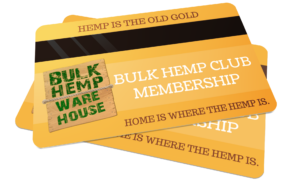Hemp 101
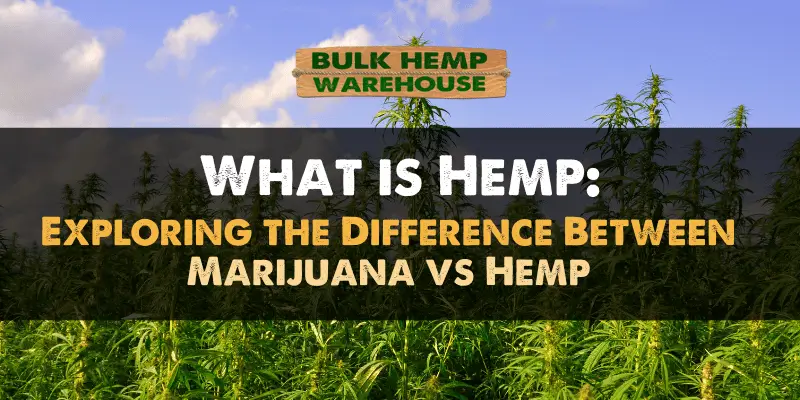
One person could invest a lifetime of time, energy and money and still not learn all that there is to know about the Cannabis Sativa Hemp Plant.
This plant is a TRUE GIFT FROM GOD, and we are forever grateful for our relationship with this plant and with YOU and our beloved planet!
What is Hemp?
Hemp, more than ever, is a plant that has the ability to sustain life on this planet.
With all 10 essential amino acids and a well balanced ratio of omega fatty acids, hemp is a vital super-food that is now contributing to the awakening of humanity and the healing of the nations.
Hemp is generally referred to as the industrial, non-psychoactive variety of Cannabis sativa L. used for a multitude of products.
Marijuana on the other hand, is referred to as the medicinal variety of Cannabis which people ingest for the psychoactive benefits.
What Are Hemp's Attributes?

Hemp grows to lengths of 10-16 feet.
It’s grown for its fiber and seed production.
It can be used to make over 25,000 different products, including textiles, paper, paint and varnishes, particle and MDF board, cellulose plastics, cordage, bio-fuel, all sorts of foods, furniture, body care products and the list goes on and on..
Popular Mechanics came out with an article in their February of 1938 issue entitled “Billion Dollar Crop”. What a bold statement and at a time when money was worth a lot more than it is today!
The fact that hemp has SO MANY uses and can be made into, literally, thousands of different products contributes to it’s MASSIVE VALUE as a CASH CROP for whatever nations are allowing its people to grow it.
As you navigate the ever-expanding world of hemp oil and hemp protein. hemp seeds, hemp fiber, hemp oil, hemp protein and many other cannabis products, you may have encountered the terms ‘hemp’ and ‘marijuana’ used interchangeably.
Despite both being derivations of the Cannabis sativa species, significant differences define what is hemp and what characterizes its more psychoactive counterpart.
Industrial hemp offers a legal, sustainable source for a variety of hemp products, from durable fibers and nutritious seeds to therapeutic cannabinoids like those found in hemp oil.
You’ll discover that while seeds contain nutritious elements, especially when considering hemp seed protein. marijuana and hemp hail from the same cannabis plant family, their uses, chemical compositions, and legal standing in the United States diverge.
Let’s unravel the traits of the hemp plant that set it apart from its more regulated relative, and why hemp production is vital for multiple industries.
Key Takeaways
- Understanding the key differences between hemp and marijuana is crucial for both consumers and producers of cannabis products.
- Industrial hemp is recognized for having high CBD content and legally containing less than 0.3% THC, a compound found in the cannabis plant, is often contrasted with hemp oil for its non-intoxicating properties..
- Hemp plants are versatile, providing fiber for textiles, seeds for nutrition, and extracts for health and wellness products.
- The 2018 Farm Bill considerably changed hemp production’s legal landscape, promoting its growth and research.
- Hemp’s low THC content differentiates it from marijuana and expands its legal and industrial uses, including the extraction of hemp oil and the usage of Canadian hemp.
- Learning about the vast potential of hemp can guide you to more sustainable and beneficial consumer choices.
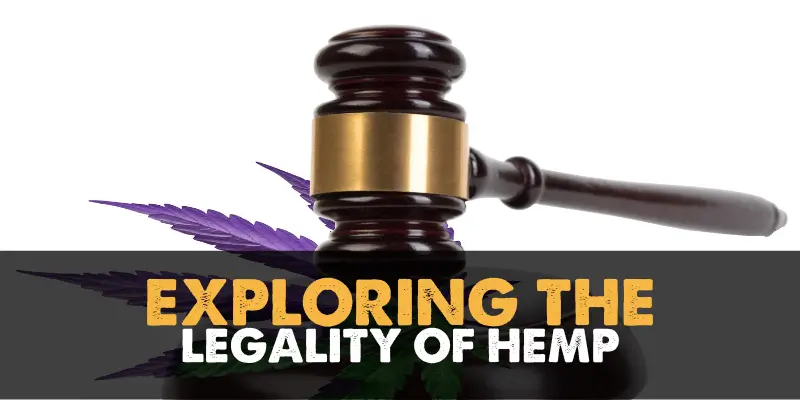
Exploring the Legality of Hemp
Following the pivotal shift in the legal landscape with the passage of the 2018 Farm Bill, your understanding of hemp’s status under United States federal law has been transformed.
The federal legalization of hemp lifted restrictions that once muddied the agricultural and commercial potential of Cannabis sativa L., enabling a surge in cultivation and research of this versatile crop.
The 2018 Farm Bill and Hemp’s Federal Legalization
All at once, the Act of 2018 cleared a path for farmers and innovators to cultivate hemp federally, indicating a significant turn towards a more accepting stance on cannabis-related products with low THC content.
This strategic move acknowledged the agricultural viability of THC hemp, that is, hemp varieties with a THC concentration of less than 0.3%, and, by extension, fueling a nationwide reevaluation of hemp’s economic promise.
Hemp vs. Marijuana: Legal Distinctions
It is fundamental to grasp the legal distinctions between hemp and its psychoactive cousin, marijuana.
Despite both stemming from Cannabis sativa L., the legality of each plant is dictated by its THC content.
Whereas hemp features minimally, marijuana’s THC levels exceed the legal threshold, tipping the scales of legality and affecting how each crop is regulated.
Global Perspectives on Hemp Cultivation and Use
Looking beyond US borders, the global perspectives on cannabis cultivation widely vary, with many countries advancing in their acceptance and framework for hemp production.
For instance, Canadian regulations have embraced the cultivation of hemp, pinpointing a trend where worldwide cultivation stretches each year, further anchoring hemp’s global footprint and its burgeoning agriculture and industry sectors.
| Country | Hemp Legal Status | THC Limit | Notable Regulations |
|---|---|---|---|
| United States | Legal | < 0.3% | Farmers must adhere to state/federal guidelines |
| Canada | Legal | < 0.3% | License required for cultivation |
| European Union | Varies by country | < 0.2% | Common Agricultural Policy supports hemp farmers |
Understanding these developments, you can appreciate the intricate balance between the burgeoning potential of hemp production and the nuanced legal tapestry that defines its global cultivation.
The act of 2018 stands not merely as a change in statute but as a herald of new eras of industrial growth and legal harmony for hemp.

What Makes Hemp Different from Marijuana?
As you delve into the world of Cannabis sativa, you’ll find that the definition of hemp is closely tied to its THC content and legal status.
Let’s explore these defining factors that set hemp apart from its cousin, marijuana, and what this means for both consumers and cultivators under federal law.
Definition of Hemp vs Marijuana
Both marijuana and hemp belong to the same species of plant, but legally they are distinguished by their THC content.
The definition of hemp, by federal standards, designates it as a cannabis plant that contains less than 0.3% of THC.
Thanks to its low levels of THC, which is the psychoactive component found in greater concentrations in marijuana, hemp does not produce the same psychoactive effects.
THC Content and Psychoactive Effects
The hallmark of hemp’s distinction lies in its THC content.
By containing less THC, specifically less than 0.3%, hemp does not impede cognitive functions and is thus free from the psychoactive effects that are often associated with marijuana use.
This unique feature allows for hemp’s wide-ranging applications in non-intoxicating products.
Industrial Hemp and its Legal Status
Industrial hemp has a notable history which recently turned a new leaf with the 2018 Farm Bill, marking hemp as legal to grow at a federal level.
This marked a pivotal shift in legally distinguishing hemp and marijuana, providing pathways for farmers and businesses to cultivate and utilize hemp for its fibers, seeds, and high content of CBD.
Hemp’s evolution as a legally permissible crop underlines its negligible psychoactive component and its potential in diverse industrial spheres.

The Surprising Benefits & Uses of Hemp
Delving into the world of Cannabis sativa L, one of the most interesting discoveries is hemp, a non-psychoactive sibling in the cannabis family.
Known for its minimal THC levels, hemp is revolutionizing industries with its vast applications that extend far beyond the scope of what most might expect from a plant commonly associated with CBD oil.
Hemp demonstrates its versatility as a powerhouse for nutritional well-being, industrial innovation, and health and wellness products.
By exploring hemp seed oil, hemp fiber, and hemp-derived extracts, you’ll uncover the functional diversity of this age-old yet forward-thinking crop.
Hemp Seed and its Nutritional Value
When you use hemp, particularly Canadian hemp, for a variety of applications from hemp oil to sustainable textiles. seeds as a food ingredient, you’re tapping into a treasure trove of nutritional value.
These small but mighty seeds are packed with essential fatty acids, boasting an optimal ratio of omega-3 to omega-6.
Rich in high-quality protein comparable to soybeans, they contain all nine essential amino acids, making them an excellent protein source for vegetarians and non-vegetarians alike.
- Rich in fiber promoting digestive health
- Loaded with minerals like magnesium, potassium, and iron
- Source of antioxidants such as vitamin E
- Lower in carbohydrates, making it a perfect addition to various diets
Industrial Applications of Hemp Fiber
The utilization of hemp fiber is a look into the sustainable future of manufacturing.
With industrial applications sprawling across the textile industry to automotive parts, the potentials seem limitless.
The cultivation of hemp for its fiber is uncomplicated by the regulations associated with higher THC cannabis varieties, yielding a high biomass that can translate into eco-friendly products, thanks to its THC content being under 0.3%.
- Textiles – offering durable, breathable, and antibacterial fabric options.
- Construction materials – such as hempcrete, for sustainable building solutions.
- Paper – a rapid growth cycle means more sustainable production compared to traditional wood pulp.
- Biodegradable plastics – showcasing the potential for hemp in reducing pollution.
CBD Oil and Hemp Extracts: Health and Wellness
CBD oil and hemp extracts, particularly rich in hemp oil and hemp seed protein, showcasing a significant shift in the industry’s focus as of 2021. are at the forefront of the health and wellness discourse, revered for their potential to manage discomfort, anxiety, and various mood disorders.
Hemp-derived products range from sublingual tinctures to topical applications and have been subject to considerable interest due to their therapeutic benefits without the high associated with THC.
As researchers continue to explore the full spectrum of hemp’s benefits, the interest in these products shows no signs of waning.
| Product Type | Common Uses | Format Variations |
|---|---|---|
| Tinctures | Mood regulation, sleep improvement | Oils, sprays |
| Topical Creams | Localized relief, skin health | Creams, balms, patches |
| Infused Beverages | Digestive support, general well-being | Teas, waters, energy drinks |
In your health and lifestyle choices, considering hemp-derived products means embracing the multifaceted nature of Cannabis sativa L.
Whether incorporating hemp seed oil for its nutritional advantages, selecting textiles of hemp fiber for durability and sustainability, or choosing CBD as a holistic approach to wellness, hemp offers a plethora of opportunities eager for exploration.
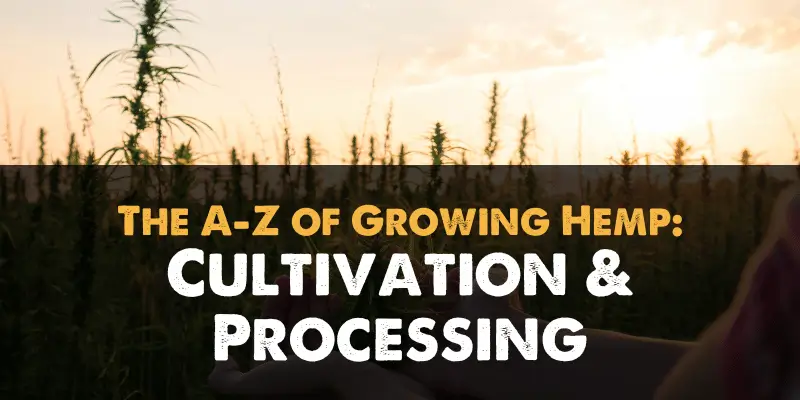
The A-Z of Growing Hemp: Cultivation and Processing
Embarking on the journey of growing hemp requires an understanding of the essential steps and the complexities involved from seed to final product.
With the legalization of hemp in the U.S., cultivators are seeking to master the art of hemp cultivation and tackle the challenges that come with this versatile crop.
As you delve into this comprehensive guide, you’ll uncover the intricacies of cultivating Cannabis sativa L. for a successful harvest.
Steps to Cultivate Hemp: From Seed to Harvest
Proper agronomic practices define the pathway to thriving hemp crops in the U.S. Begin by selecting cannabis seeds known for their quality and resilience.
Focus on the best growing conditions, ensuring optimal soil health, which is paramount for seed cultivation.
Be vigilant in monitoring growth stages meticulously and preparing for the harvest, which demands precision and timing. Each choice impacts the eventual yield and quality of your hemp crop.
Processing Hemp for Fiber, Seed, and Cannabinoids
After the harvest, the processing phase begins. Transforming the raw hemp into useful products is no small feat.
For fiber production, facilities use milling equipment to overcome hemp’s toughness, turning sturdy stalks into soft fibers.
Seed processing distinguishes itself with a focus on preservation and purity for various healthful applications.
Cannabinoid extraction, aiming for high-quality therapeutic products, involves complex methodologies to extract CBD and other valuable compounds.
Challenges in Hemp Cultivation
The crop’s versatility comes with distinct challenges in cultivation.
Navigating through federal and state regulations, ensuring crops adhere to the less than 0.3% THC threshold, and managing the plant’s diversity all present hurdles.
Additionally, the robust nature of Cannabis sativa L. can complicate the harvest and subsequent processing stages.
Precision, dedication, and constant learning are vital for surmounting these challenges and reaping the full benefits of this industrious plant.
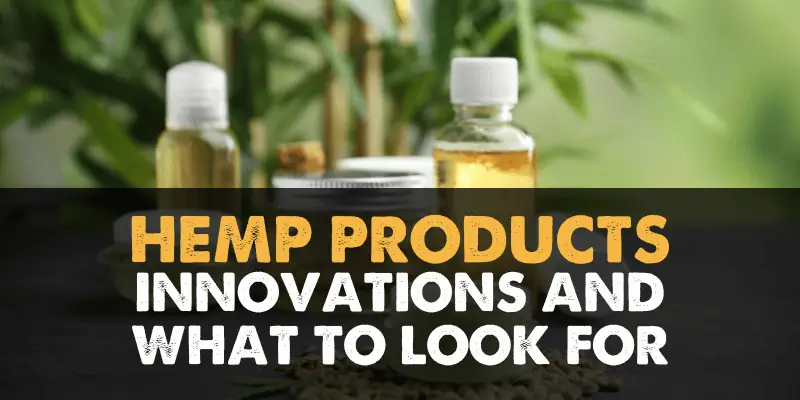
Hemp Products: Innovations and What to Look For
As the hemp industry evolves, you’re witnessing a surge in innovative hemp products making their way into the consumer market.
From hemp in consumer products, like robust textiles and versatile tinctures, to a myriad of CBD offerings, understanding how these items fit into your lifestyle is key.
Hemp fibre production is setting new benchmarks for sustainability, supplying a renewable and eco-friendly material for fabric and paper alternatives.
Moreover, the inexorable rise of hemp-derived products underscores the plant’s significant role in today’s natural products movement, significantly influenced by the push to legalize hemp-derived products.
Hemp in Consumer Products: From Textiles to Tinctures
The inclusion of hemp in consumer products is revolutionizing the market, with hemp fibre production offering environmentally conscious alternatives that challenge traditional manufacturing methods.
Whether it’s durable textiles for clothing or innovative uses in building materials, the versatility of hemp fiber is showing no signs of slowing down.
Beyond fiber production, tinctures derived from hemp epitomize the crossover into health and wellness realms, signaling a shift towards plant-based remedies and supplements.
Choosing Quality Hemp-Derived CBD Products
When considering the vast array of CBD products available, choosing quality hemp-derived CBD becomes crucial.
Your attention should be on products adhering to Food and Drug Administration (FDA) regulations, ensuring that what you consume or apply is safe and effective.
Look for signs of third-party testing, comprehensive labeling, and brand transparency to guarantee that the hemp product meets your expectations for quality and efficacy.
It’s this savvy consumerism that encourages the industry to maintain high standards.
The Future of Hemp Products and Market Trends
Peering into the future of hemp products, anticipate a landscape driven by consumer demands for sustainable and innovative solutions.
Market trends suggest a continuation of growth in hemp-derived offerings, particularly as awareness around the benefits of natural products expands.
Whether it’s through advanced CBD oil formulations or the advent of hemp-based materials in everyday products, your engagement with hemp innovations will likely shape the trajectory of this burgeoning sector.
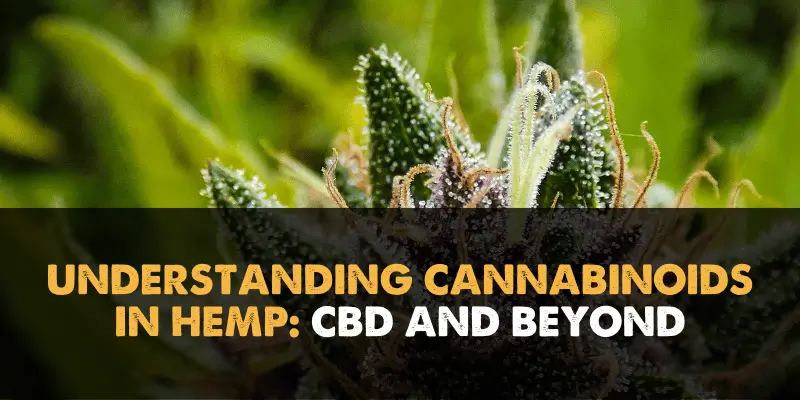
Understanding Cannabinoids in Hemp: CBD and Beyond
As the cannabis industry evolves, understanding the complexities and the benefits of hemp seed protein becomes crucial. therapeutic effects of the cannabinoids in hemp is pivotal.
Hemp-derived CBD has been a groundbreaking compound in the industry, spotlighting the plant’s potential beyond the psychoactive effects associated with THC.
Here, we delve into the roles of these compounds, the contrast between CBD and THC, and other significant cannabinoids that make hemp a versatile botanical powerhouse.
The Role of Cannabinoids in Hemp
The myriad of cannabinoids in hemp impact the body’s endocannabinoid system, orchestrating a sequence of therapeutic effects.
The pioneer of these, cannabidiol (CBD), has caught international attention for its non-intoxicating properties and its usability in medical cannabis, often associated with .
Yet, this is just the tip of the iceberg. With ongoing research, we are beginning to appreciate the full scope of hemp’s cannabinoid profile for holistic health benefits.
CBD vs. THC: Effects and Uses
When discussing CBD products, a comparison with THC often arises.
CBD, or cannabidiol, is a highly sought-after cannabinoid due to its promising therapeutic effects without notable psychoactive impact.
Conversely, tetrahydrocannabinol (THC) is known for its
However, legal hemp-derived CBD must contain THC content of less than 0.3%, ensuring the user experiences no psychoactive effects while harnessing the potential medical benefits.
Exploring Lesser-Known Cannabinoids in Hemp
Beyond CBD and THC, hemp contains a spectrum of lesser-known cannabinoids, such as cannabigerol (CBG), which may offer similar health benefits.
The compound has shown promise in early studies, prompting further exploration into how it and other cannabinoids can contribute to the therapeutic effects of cannabinoid extraction and use in CBD products.
| Cannabinoid | Effects | Common Uses |
|---|---|---|
| CBD (Cannabidiol) | Non-intoxicating, anti-inflammatory, analgesic | Medical treatments, wellness supplements |
| THC (Tetrahydrocannabinol, with a concentration below 0.3% in hemp, significantly differentiates it from other cannabis plants and emphasizes the versatility of hemp oil.) | Psychoactive, euphoria, pain relief | Recreational use, certain medical applications |
| CBG (Cannabigerol) | Non-intoxicating, anti-bacterial, neuroprotectant | Research into neurodegenerative diseases, therapeutic treatments, and the potential of hemp seed protein in 2021. |

What is the Vision for the Future of Hemp?
With the help from all the intelligent statesmen, lawyers, agricultural commissioners, teachers, mothers, fathers, visionaries, writers, inventor and so on.
“We the People of the United States” enjoy the value-added benefits of farming and manufacturing hemp here in the U.S.. it just makes sense – it makes cents too.
The old paradigm was that hemp was bad, or marijuana, or cannabis. However, we are here to share with the world every reason why Hemp is Good.
Conclusion to What is Hemp, and the Difference Between Hemp and Marijuana
To wrap this up, I just want you know that you’re in the right place when it comes to hemp education.
With almost 20 years of experience in the hemp industry we bring you first hand knowledge ane education on this topic.
Not to mention we are passionate, enthusiastic group of people that are on a clear mission to bring more hemp to people like you, to make this world a healthier, safer, more sustainable place.
So hopefully you have a good understanding of the difference between hemp and cannabis (cause the word marijuana is a derogatory word), and what is hemp, really.
I shared with you what the legal distinction is, as well as the different products made from hemp and cannabis.
The most important thing to realize is that, all hemp is cannabis, but not all cannabis is hemp.
Basically, any hemp (or hemp product) that contains less than 0.3% THC is considered hemp. Therefore any cannabis with 0.31% or higher is considered “marijuana.”
So there you have it. Now you can go hempducate your grandma and local sheriff about the differences between these two varieties of cannabis.
The Many Uses of Hemp:
Hemp Arts:
- Inspiration
- Brushes
- Paints
- Canvas
- Twines/Yarns
Hemp Automotive:
- Fiber composites
- Fuel
- Lubricants
- Plastics
- Upholstery
Hemp Boating & Nautical Hemp:
- Lantern oil
- Rigging/Ropes
- Sails
- Deck Sealer and Stain
- Canvas Cushions
Hemp Body:
- Clothing
- Body oil
- Soaps
- Dyes (henna)
- Jewelry
Hemp Construction:
- Hemp Board
- Beams
- Heavy duty bags
- Plaster
- Rope
- Sealers
Hemp Home:
- Sheets
- Towels
- Tables
- Twine
- Chairs
- Napkins
- Curtains
- Wall covers
Hemp Economy/Ecology:
- Hemp Farming
- Hemp Companies
- Hemp Shoppers
- Clean Air
- Clean Soil
- Clean Water
Add Your Heading Text Here
Lorem ipsum dolor sit amet, consectetur adipiscing elit. Ut elit tellus, luctus nec ullamcorper mattis, pulvinar dapibus leo.
Discover More at www.HempAware.com
If you’re a start up hemp company or an established and successful large company already, you will thoroughly enjoy the educational and marketing resources for industrial hemp at HempAware!

